Activities
Science-Policy Dialogue on Climate Change, Extreme Events and Adaptation in Maharashtra
7th June 2014,
Y. B. Chavan Centre, Mumbai
Agenda
The Science-Policy Dialogue will draw on the findings of the Indo-Norwegian EVA research project, which studied the enabling conditions for effective community-based adaptation to the impacts of extreme drought on agriculture and water resources in Marathwada.
In this Science-Policy Dialogue, the EVA study team will present the findings of participatory assessments of vulnerability and adaptive capacity conducted in nine villages of Jalna district before, during, and after the severe drought of 2012-13. The learnings from our field work will be presented on the following themes:
- Vulnerability of water resources to extreme drought in Jalna
- Socioeconomic vulnerability of rural households
- Adaptation priorities for different social groups
- Governance and institutional aspects of adaptation
- Gender considerations in adaptation
- Capacity building needs for community based adaptation
Policy briefs and technical briefs on these themes will be disseminated.
The workshop participants will include:
- Government officials from the state and district levels
- Key organizations in scaling up adaptation and capacity building like NABARD, YASHADA, Agriculture Insurance Corporation
- Agriculture universities and agriculture extension agencies
- Farmers and sarpanches from the case study villages
- Indian and Norwegian research institutions
- Representatives of the Norwegian Embassy in India
We will discuss how rural communities can become more resilient to future climate extremes, how policy and implementation gaps can be bridged, and what avenues can be explored to support and scale up community-level adaptation.
The project “Extreme Risks, Vulnerabilities, and Community-Based Adaptation in India (EVA): A Pilot Study in Maharashtra” is a collaborative endeavour of TERI, Action for Food Production (AFPRO), Norwegian Institute for Urban and Regional Research (NIBR), Norwegian Institute for Water Research (NIVA), and Center for International Climate and Environmental Research, Oslo (CICERO), and is funded by the Royal Norwegian Embassy in New Delhi.
Launch of EVA Booklet ‘Drought in Jalna’ in DSDS 2014 (February 2014)
In an effort to disseminate the findings of the EVA project to a wider audience, a booklet has been prepared titled ‘Drought in Jalna’. The booklet was launched in February 2014 in a special event as part of the Delhi Sustainable Development Summit (DSDS) 2014. The launch of the booklet was done by HE Mr Lars Andreas Lunde, Deputy Minister of Climate & Environment, Norway; HE Mr. Eivind Homme, Ambassador of Norway to India and Dr Rajendra K. Pachauri, Director General, TERI. The launch event also had a session to discuss climate change adaptation in drylands. There was an overview presentation on the EVA project, with a discussion of its objectives and research activities, including the methodology, impacts, and policy recommendations in the context of the 2013 drought in Jalna District, Maharashtra. Download booklet
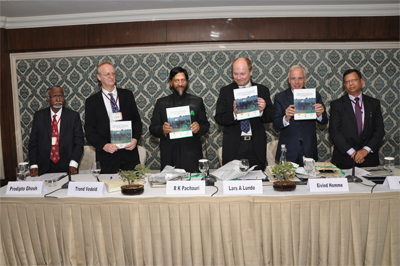
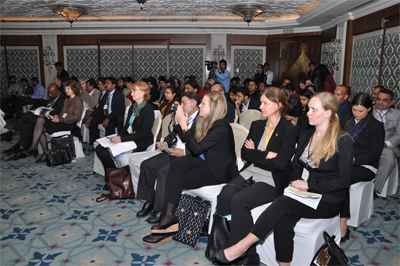
Cluster level workshop in Jalna for prioritization of adaptation options (October 2013)
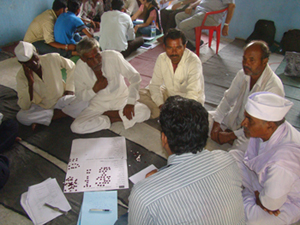 Cluster level workshops were conducted in each of the three village clusters of EVA project – Bhokardan, Badnapur and Jaffrabad for prioritization of adaptation options identified during the February round of field work in Jalna. The participants primarily included communities from the three villages within the cluster and some representatives of KVK. Scoring of all the adaptation options was done with respect to the two identified criteria. This exercise was done within smaller groups of farmers with institutional affiliation, farmers with no-institutional affiliation, women and landless/labourers.
Cluster level workshops were conducted in each of the three village clusters of EVA project – Bhokardan, Badnapur and Jaffrabad for prioritization of adaptation options identified during the February round of field work in Jalna. The participants primarily included communities from the three villages within the cluster and some representatives of KVK. Scoring of all the adaptation options was done with respect to the two identified criteria. This exercise was done within smaller groups of farmers with institutional affiliation, farmers with no-institutional affiliation, women and landless/labourers.
Social Interviews with multi-stakeholders (October 2013)
A number of social interviews were done with representatives of specific groups of the communities including small and marginal farmers and women. The purpose of the interviews was to know some of the major issues/vulnerabilities faced by different social groups. A series of interviews were carried out with different stakeholders such as block level officers, KVK members to understand the institutional and governance regime in the region.
Block Level Workshop for prioritization of adaptation options (July 2013)

 One of the main outputs expected from the EVA project is a set of identified and prioritized adaptation options for drought prone region of Jalna, Maharashtra. As a next step towards achieving this goal a workshop was conducted by EVA team researchers from TERI and AFPRO in July. The participants of the workshop included block level officers from the three study blocks (Badnapur, Bhokardan and Jafrabad) of EVA project in Jalna. The objective of the workshop was to prioritize adaptation options pertaining to agriculture, water and social development. The list of these options was prepared on the basis of consultation with the communities and district level officers during field visit in February. During the workshop, an overview was given on preliminary results on past climate trends and future climate projections for Jalna region. The main activity of the workshop included ranking of criteria for prioritization of adaptation options. The participants were divided into thematic sub-groups and within each group prioritization of adaptation options was done.
One of the main outputs expected from the EVA project is a set of identified and prioritized adaptation options for drought prone region of Jalna, Maharashtra. As a next step towards achieving this goal a workshop was conducted by EVA team researchers from TERI and AFPRO in July. The participants of the workshop included block level officers from the three study blocks (Badnapur, Bhokardan and Jafrabad) of EVA project in Jalna. The objective of the workshop was to prioritize adaptation options pertaining to agriculture, water and social development. The list of these options was prepared on the basis of consultation with the communities and district level officers during field visit in February. During the workshop, an overview was given on preliminary results on past climate trends and future climate projections for Jalna region. The main activity of the workshop included ranking of criteria for prioritization of adaptation options. The participants were divided into thematic sub-groups and within each group prioritization of adaptation options was done.
Community level Workshop to share best practices (July 2013)

 The drought of 2012 was one of the worst droughts faced in Maharashtra. However, even within the drought-hit region there were some villages who could cope with the drought without any major impacts on their crops. As part of the EVA project, we conducted a workshop to bring together such farmers with the objective of sharing best practices and learning from their experience. There were farmers from Shivani and Kadwanchi villages which have been successful in coping with last year’s drought to some extent. Farmers from badly hit villages in Badnapur, Bhokardan and Jafrabad also participated in the workshop. The discussions revealed that collective action by the communities for water conservation can be instrumental in building resilience of the region towards extreme events such as droughts.
The drought of 2012 was one of the worst droughts faced in Maharashtra. However, even within the drought-hit region there were some villages who could cope with the drought without any major impacts on their crops. As part of the EVA project, we conducted a workshop to bring together such farmers with the objective of sharing best practices and learning from their experience. There were farmers from Shivani and Kadwanchi villages which have been successful in coping with last year’s drought to some extent. Farmers from badly hit villages in Badnapur, Bhokardan and Jafrabad also participated in the workshop. The discussions revealed that collective action by the communities for water conservation can be instrumental in building resilience of the region towards extreme events such as droughts.
EVA researchers presented work on participatory drought mapping at the European Climate Change Adaptation Conference in Hamburg (18th-20th March 2013)
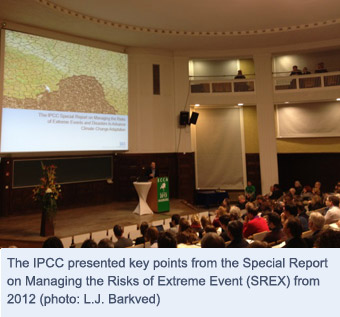
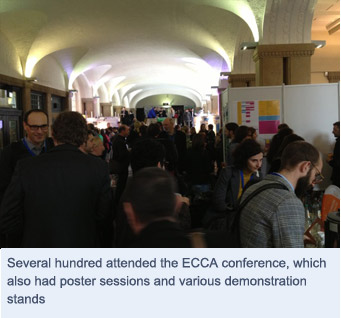 EVA researchers team members presented the first results from the participatory drought mapping carried out within the project at the European Climate Change Adaptation Conference (ECCA) in Hamburg, 18-20th March 2013. The theme of the ECCA conference was “integrating climate into action” and in total about 700 participants from all around the world attended. The conference was organized in several plenum and parallel sessions with the aim of bringing together scientists, policy-makers and practitioners working on adaptation to the impacts of climate change. Line J. Barkved from NIVA gave the presentation “Participatory mapping for drought resilience in Jalna District, Maharashtra, India” on behalf of the team in the session “Role of tools and knowledge in adaptation – participatory methods” on the 20th of March. Karianne de Bruin from CICERO also attended the conference and the after-discussions in the session. The EVA presentation spurred interesting questions and comments around dealing with droughts and participatory mapping as a method, and the project made valuable contacts for further dialogue and exchange.
EVA researchers team members presented the first results from the participatory drought mapping carried out within the project at the European Climate Change Adaptation Conference (ECCA) in Hamburg, 18-20th March 2013. The theme of the ECCA conference was “integrating climate into action” and in total about 700 participants from all around the world attended. The conference was organized in several plenum and parallel sessions with the aim of bringing together scientists, policy-makers and practitioners working on adaptation to the impacts of climate change. Line J. Barkved from NIVA gave the presentation “Participatory mapping for drought resilience in Jalna District, Maharashtra, India” on behalf of the team in the session “Role of tools and knowledge in adaptation – participatory methods” on the 20th of March. Karianne de Bruin from CICERO also attended the conference and the after-discussions in the session. The EVA presentation spurred interesting questions and comments around dealing with droughts and participatory mapping as a method, and the project made valuable contacts for further dialogue and exchange.
District Workshop (February 2013)
 A district level workshop involving multi stakeholders was conducted in Jalna, Maharashtra. The workshop was attended by the Collector of Jalna District, scientists from Badnapur Research Station, officials from NABARD and Bank of Maharashtra as well as representatives from some of the villages under this project. The project and its overall activities were introduced to the participants along with giving an overview of the activities carried out till now including the future climate model projections. One of the key objectives of the workshop included getting the views of the participants on the kind of impacts and challenges faced by the communities, likely adaptation options and the barriers for implementing these adaptation options in the current context as well as likely future scenarios.
A district level workshop involving multi stakeholders was conducted in Jalna, Maharashtra. The workshop was attended by the Collector of Jalna District, scientists from Badnapur Research Station, officials from NABARD and Bank of Maharashtra as well as representatives from some of the villages under this project. The project and its overall activities were introduced to the participants along with giving an overview of the activities carried out till now including the future climate model projections. One of the key objectives of the workshop included getting the views of the participants on the kind of impacts and challenges faced by the communities, likely adaptation options and the barriers for implementing these adaptation options in the current context as well as likely future scenarios.
Village Cluster level Workshops (February 2013)
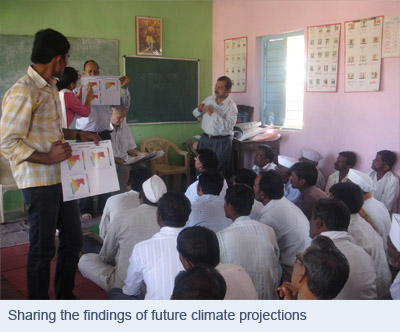 In February 2013, next round of field visits were conducted, involving cluster level workshops for each of the village clusters selected for this pilot study. The objective of the workshops was to get an understanding of the perceptions of the communities on the likely adaptation options which can be implemented to enhance their adaptive capacity. The views were obtained in the context of current drought conditions as well as for future scenarios by sharing some of the findings of the future climate projections done under the project. Some of the activities conducted during the workshop included the validation of the maps drawn during the previous visit and taking it further by identifying major drought zones with respect to agriculture and water resources.
In February 2013, next round of field visits were conducted, involving cluster level workshops for each of the village clusters selected for this pilot study. The objective of the workshops was to get an understanding of the perceptions of the communities on the likely adaptation options which can be implemented to enhance their adaptive capacity. The views were obtained in the context of current drought conditions as well as for future scenarios by sharing some of the findings of the future climate projections done under the project. Some of the activities conducted during the workshop included the validation of the maps drawn during the previous visit and taking it further by identifying major drought zones with respect to agriculture and water resources.
Field Visit to Jalna, Maharashtra (September 2012)

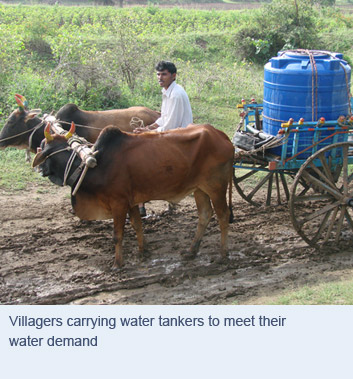 In September the EVA project team went for a field visit to Jalna district, Maharashtra with an elaborate list of activities. The idea was to visit each of the villages identified under the pilot phase and interact with the communities. Different types of participatory tools were used to get a feel of the prevailing conditions in the villages in terms of natural resources and livelihoods. One of the important tools used to understand the village was participatory mapping exercise using high resolution Google Earth images. The main objectives were to understand different types of cropping patterns, present conditions of the village related to water and agriculture, and the problems and challenges faced by the farmers. The rationale to carry out such participatory tools was also to get the local communities involved in the process. Since 2012 was a drought year for Jalna, so the responses and interaction with the communities helped us to know the kind of impacts which the villagers face during an extreme event.
In September the EVA project team went for a field visit to Jalna district, Maharashtra with an elaborate list of activities. The idea was to visit each of the villages identified under the pilot phase and interact with the communities. Different types of participatory tools were used to get a feel of the prevailing conditions in the villages in terms of natural resources and livelihoods. One of the important tools used to understand the village was participatory mapping exercise using high resolution Google Earth images. The main objectives were to understand different types of cropping patterns, present conditions of the village related to water and agriculture, and the problems and challenges faced by the farmers. The rationale to carry out such participatory tools was also to get the local communities involved in the process. Since 2012 was a drought year for Jalna, so the responses and interaction with the communities helped us to know the kind of impacts which the villagers face during an extreme event.
Project Initiation Field visit (April 2012)
EVA researchers initiated the project by visiting the study area in Jalna in April 2012. They interacted with farmers from Asarkheda, Dongaon and Nivdunga villages to understand changes in agriculture and community level adaptive capacity.
read more